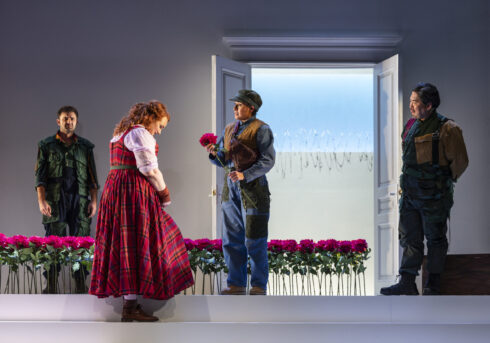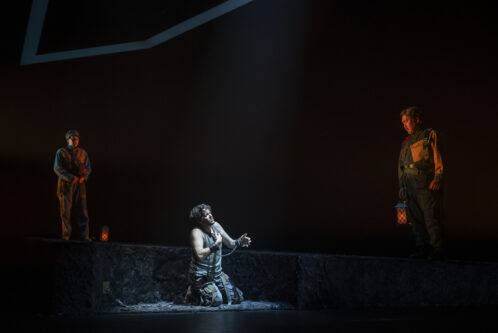 United States Ferdinando Paër, Leonora: Soloists and Orchestra of Chicago Opera Theater / Dame Jane Glover (conductor). Studebaker Theater, Chicago, 4.10.2024. (ZC)
United States Ferdinando Paër, Leonora: Soloists and Orchestra of Chicago Opera Theater / Dame Jane Glover (conductor). Studebaker Theater, Chicago, 4.10.2024. (ZC)

Production:
Director – Lawrence Edelson
Sets – Cameron Anderson
Costumes – Brenda Winstead
Lighting – Josh Epstein
Cast:
Fedele / Leonora – Vanessa Becerra
Florestano – Edgardo Rocha
Marcellina – Keely Futterer
Rocco – Joo Won Kang
Don Pizzarro – Matthew Pearce
Giachino – Alex Soare
Don Fernando – Kameron Alston
As the overture of Ferdinando Paër’s Leonora filled the historic Studebaker Theater, the audience for Chicago Opera Theater’s opening opera of the season experienced a once-in-a-lifetime opportunity to witness an important – yet sadly overlooked – early-nineteenth-century work. In fact, calling this a once-in-a-lifetime opportunity may understate its rarity: the performances of Leonora that began on 4 October marked its North American premiere. Chicago Opera Theater’s production complements the Lyric Opera’s run of Beethoven’s Fidelio, not only bringing the story of love and tyranny to life but also showcasing the emotional depth that Paër infused into the music, which stands in contrast to Beethoven’s take on the same story.
Given the infrequency of performances, each note of the opera felt like a chance to experience a piece of history. Composed in 1804, Leonora serves as a significant link between the serious and comic styles of the time. The echoes of Beethoven’s Fidelio are unmistakable, yet the two operas present markedly different narratives and musical styles. Both center on themes of love and liberation, with strong female protagonists fighting against the oppressive forces of the state, but Paër’s approach is often lighthearted and melodically rich, blending moments of comedy and drama.
While Beethoven’s Fidelio delves deeply into the gravity of political imprisonment and moral fortitude, Leonora balances these serious undertones with playful arias and a lighter, more lyrical texture. The biggest difference between the two is Paër’s more developed role for Marcellina. In Leonora, Marcellina opens the action by quickly establishing that she is willing to do almost anything for love. This is later reflected by Leonora, who has concealed herself as Fedele in an elaborate plot to gain access to Florestano, her imprisoned lover. Marcellina’s other job is to provide a diversion from the opera’s underlying seriousness.
The contrasts in orchestration further highlight the differences: Beethoven’s score is bold and expansive, reflecting the weight of its themes, whereas Paër employs an intimate orchestral palette that enhances the emotional nuances of his characters. Leading the orchestra for the performances was Dame Jane Glover. She deftly guided the orchestra through the piece’s shifting moods and melodies, presenting a clear interpretation that brought this unfamiliar opera to life in a way that felt both authentic and engaging. The orchestra responded with commendable expressiveness – even if the playing was not always the last word on precision – and offered strong support for the opera’s talented cast.

Keely Futterer’s Marcellina spends most of the opera longing for her Fedele (Leonora in disguise). Futterer’s nimble performance and lighter soprano voice were well-suited to the role. Joining her as part of the comic relief was Giachino, who was given a jaunty performance by bass Alex Soare. But stealing the show was soprano Vanessa Becerra in the title role of Leonora. For half the opera, Becerra was disguised as Fedele, but when she literally let her hair down in Act II, her character blossomed, and her singing took flight as she traversed the dual roles with effortless vocal flourishes. Opposite Becerra was tenor Edgardo Rocha whose smooth, longing portrayal of Florestano was easy to love. Joo Won Kang, Matthew Pearce and Kameron Alston added their standout performances as Rocco, Don Pizzarro and Don Fernando respectively.
The sets, lighting and direction were also effective. Lawrence Edelson, General Director of Chicago Opera Theater, directed one of the most engrossing opera productions I have seen in recent years. Helping him were Cameron Anderson with sets and Josh Epstein with lighting. Anderson’s sets were clean yet convincing in how they allowed the action to unfold, and Epstein’s lighting choices added a visual dimension that matched the dramatic cues on stage.
Chicago Opera Theater’s production of Paër’s Leonora is a remarkable achievement and honors an historically significant work forgotten by most opera houses. The combination of a talented cast, expert direction and engaging visual design created an experience that will not be easily forgotten, making it one of the most important classical events in Chicago this year. Hopefully, it won’t take centuries for this continent to see another production.
Zach Carstensen
